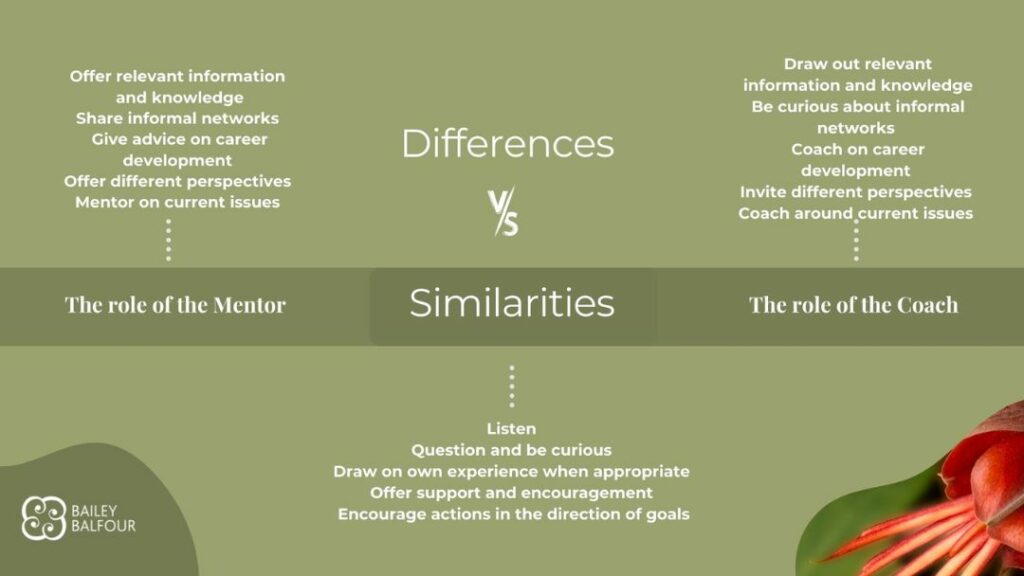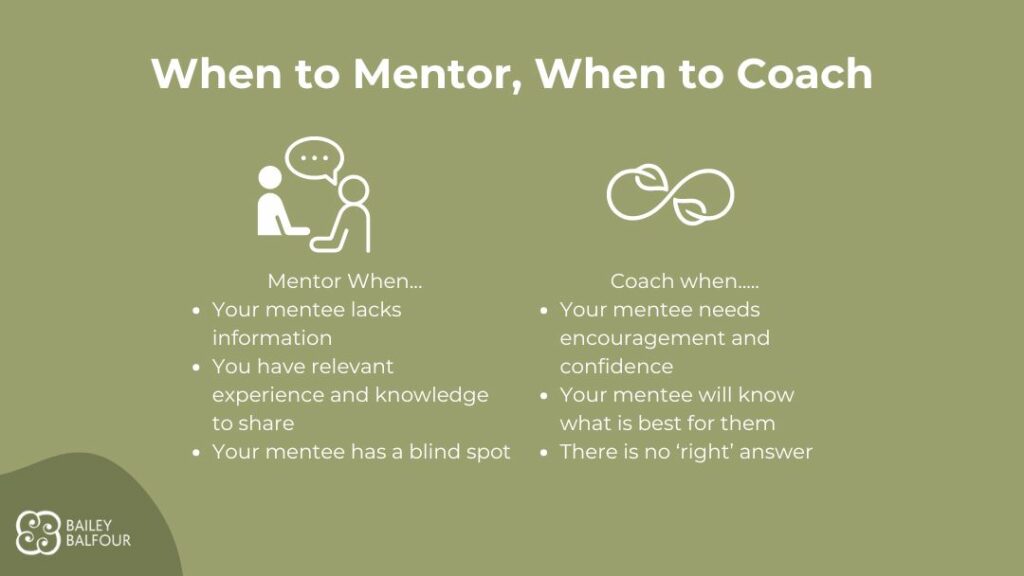
Mentoring vs. Coaching: Everything You Need to Know
In today’s fast-paced and competitive world, personal and career development has become fundamental to success. We are all seeing the need for more knowledge transfer and shared expertise to get ahead.
Both Coaching and Mentoring can significantly help us as we seek the professional growth we need in order to progress. Coaching and mentoring are distinct approaches, each with unique processes, goals, and outcomes. Understanding the differences between these two methods can help us enhance our skills, advance our careers, and help others achieve their potential.
This blog will explore the key differences between coaching and mentoring, jumping into their respective benefits and processes. By understanding these distinctions, you can make informed decisions about which approach is best suited to your development needs or those of your organisation.
If you’re thinking about becoming either a coach or mentor, here’s a good read for you!
Jump to Each Section
Who Is a Mentor?
Have you ever encountered a roadblock in life or a career hurdle and needed guidance or a sounding board to navigate through it for a season? Chances are, you sought help from a trusted advisor—perhaps a leader in your company, someone with expert knowledge in that domain, or someone you admire. This person is known as a mentor.
A mentor is a trusted advisor who shares their knowledge, skills, and experience to help guide another person’s journey, be it in life, career, or an interest. Mentors often focus on broader career and life goals, providing guidance based on their own experiences and helping the mentee grow over time to achieve their objective. It invoices a long-term relationship where the mentor provides ongoing support, advice, and encouragement to the mentee.
Who is a Coach?
According to the International Coaching Federation (ICF), coaching is defined as “partnering with clients in a thought-provoking and creative process that inspires them to maximise their personal and professional potential”
This process is client-driven and focuses on setting goals, creating outcomes, and managing personal change. The coach’s role involves discovering, clarifying, and aligning with what the client wants to achieve, encouraging self-discovery, which creates client-generated solutions and strategies, and holding the client accountable.
This definition emphasises the collaborative nature of coaching, where the coach acts as a partner who evokes insights supporting clients in designing their own actionable and sustainable strategies for success.
Difference Between Coaching and Mentoring
There are several key differences between a coach and a mentor. These differences include the roles they play, the techniques they use, the types of questions they ask, the outcomes of their sessions, and who is responsible for coming up with the solutions.
Difference in Role
Mentors serve as advisors and role models, providing guidance based on their own experiences and solutions to problems. For example, if you have a problem and need answers, mentors will offer what worked for them in the past, and share resources you can look for.
Whereas coaches are not domain experts but have the expertise to help clients come up with their own solutions to achieve specific goals and improve their performance. For example, if you have a problem and need answers, they’ll start by asking what your objective is, and what you’re trying to achieve, and ask thought-provoking questions to help you find the answers and resources you think you’ll need to solve your problem.
Difference in Techniques
Mentors use techniques like storytelling, giving good feedback, open-ended questioning, goal setting, and sharing personal experiences to guide their mentees. Mentors may ask questions but also provide direct advice and insights based on their knowledge and experience.
Coaches use a specific skill set that includes active listening, curiosity, powerful questioning, and various coaching methodologies like T-GROW or the Ladder of Inference to effectively navigate their sessions.
At Bailey Balfour, we train leaders to become effective coaches by following the competencies established by the International Coaching Federation (ICF). Our leaders are trained against these competencies to ensure they provide high-quality coaching that helps clients come up with an outcome!
Difference in Solution Creation
In coaching, clients are encouraged to develop their own solutions and strategies. In mentoring, mentors often provide guidance and recommendations based on their expertise.
Similarities Between Coaching and Mentoring
Focus on Development
Both coaching and mentoring aim to support the personal and professional development of the individual. They help individuals grow their skills, gain new insights, and achieve their goals.
Guidance and Support
Coaches and mentors provide guidance and support to help individuals navigate their careers, overcome obstacles, and make informed decisions. They act as a sounding board and offer valuable feedback.
Goal-Oriented
Both coaching and mentoring involve setting goals and working towards achieving them. They help individuals clarify their objectives and create actionable plans to reach those goals.
Encouragement and Motivation
Coaches and mentors encourage and motivate individuals to push beyond their comfort zones and strive for excellence. They help build confidence and resilience.
Skill Enhancement
Both practices focus on enhancing the individual’s skills. Whether it’s leadership, communication, problem-solving, or other competencies, coaching and mentoring aim to develop these abilities.
Why do People Seek Coaches
When you’re working towards solving a problem or achieving a goal and need a sounding board and accountability partner, seeking out a coach can be invaluable.
Coaches are highly trained professionals who help you identify and reflect on blind spots that may be hindering your growth.
They facilitate this in a way that empowers you to discover solutions yourself, making the coaching process more empowering and ensuring you feel in control and in the driver’s seat.
Coachees often gain deeper insights into the root causes of their challenges and why they feel stuck. They collaborate with their coach to identify issues and develop strategies to move forward effectively.
In such circumstances, people hire coaches to help them.
This is why executive and career coaches are sought to navigate the workplace and build careers. Coaches can also help develop leaders, support entrepreneurs, and address life challenges.
Why do People Seek Mentors
If you are seeking solutions, proven concepts, or a way forward, and need encouragement or an extra push to achieve your goals, mentors are essential to your success.
Mentors can provide clarity on what may seem complex to you but straightforward to them, guiding you with their experience and insights.
Mentors act as sounding boards, offer reassurance, and motivate mentees to stay focused on their goals.
You can look for a mentor if you lack the critical competency needed to succeed in your field, are seeking networking opportunities, or need advice on career advancement.
Mentors can provide strategic guidance and support, helping you navigate challenges and achieve your goals. There are more reasons to find a mentor, but these are just the common few!
Here’s a Scenario
Sally recently joined an organisation as a senior leader. She is leading a new team and has noticed some political dynamics. She has observed that her team seems to be dismissive when she speaks, leaving her uncertain about how to move forward. She feels demoralised and doesn’t feel she can move forward any longer.
Sally is deciding who is best to journey with her in this.
How a coach will help:
Sally can hire an executive coach to help her define her goals and objectives. If the goal is for Sally to gain respect from her team, the coach will ask her reflective questions to identify strategies for achieving this.
As Sally considers these questions and formulates potential solutions, she can then implement these strategies with her team. She will continue to work with the coach, adjusting and refining her approach until she finds an outcome that she is satisfied with and feels empowered by.
How a mentor will help:
Sally will reach out to a friend who has experienced a similar situation. This mentor will share techniques she has successfully used with her own team for Sally to try.
Additionally, her mentor will provide reassurance about the future. If the mentor has exhausted all their knowledge to help sally. The mentor might refer more people in their network to help Sally out.
Here’s another Scenario
John wants to secure a senior position in the financial industry. He realises he needs to acquire additional financial knowledge and navigate organisational red tape to apply for the position. John is deciding who would be the best
John is deciding who is best to journey with her in this.
How a coach will help:
John hires an executive coach to help him find ways to reach his outcome, which is get the position.
How a mentor will help:
John reaches out to a mentoring network to find someone who can help him understand key financial concepts he finds challenging and what is needed for organisational success and for his role as a leader.
Should I Become a Coach or Mentor?
Becoming a Coach
Pros:
- Structured Approach: Coaching often follows a structured methodology, such as the T-GROW model, which can be appealing if you prefer a systematic approach to helping others
- Specific Skill Development: As a coach, you can help clients develop specific skills and achieve particular goals, which can be highly rewarding if you enjoy seeing tangible progress.
- Professional Recognition: Coaching credentials, like those from the International Coaching Federation (ICF), can enhance your professional credibility and open up career opportunities
- Broad Applicability: Coaching skills are transferable across various industries and roles, making it a versatile career choice.
Cons:
- Intensive Training: Becoming a certified coach requires significant training and ongoing professional development
- Client Commitment: Coaching relationships often require regular, scheduled sessions, which can be time-consuming.
Ideal For: Individuals who enjoy working within a structured framework, are interested in professional development, and want to focus on specific, measurable outcomes.
Becoming a Mentor
Pros:
- Long-Term Relationships: Mentoring often involves developing deep, long-term relationships with mentees, which can be very fulfilling.
- Personal Impact: As a mentor, you can have a significant personal impact on someone’s career and life by sharing your experiences and wisdom.
- Flexibility: Mentoring relationships can be more informal and flexible compared to coaching, making it easier to fit into your schedule.
Cons:
- Less Formal Training: While this can be a pro for some, the lack of formal training and credentials might not appeal to those seeking structured professional development.
- Emotional Investment: Mentoring can be emotionally demanding, as it often involves guiding someone through personal and professional challenges.
Ideal For: Individuals who have significant experience in their field, enjoy building personal relationships, and want to give back by guiding others through their career journeys.
Key Considerations
- Your Goals: If you aim to help others achieve specific goals and improve performance, coaching might be the better choice. If you want to share your knowledge and experience over the long term, mentoring could be more suitable.
- Your Skills: Consider your strengths. Are you good at asking insightful questions and facilitating self-discovery (coaching)? Or do you excel at giving advice based on your experience and providing emotional support (mentoring)?
- Commitment Level: Think about the level of commitment you can provide. Coaching often requires a more structured and time-intensive approach, whereas mentoring can be more flexible.
Here are more resources you can discover:
Become a great leader who coaches at every opportunity and see improved performance in your teams. Join our Level 1 ICF Coach Training Programme. Register today!

Who are we?
Learn more about Bailey Balfour, who we are, our values, and how 22 years of executive coaching experience inspired our acclaimed IFC accredited training programmes. Meet our faculty and discover why you might like to learn with us.

Free Taster
One of the most effective ways to decide whether our programme is the best for you is to experience a short taster – to see what you could expect and get a feel for the different elements of our courses including mentor coaching, our self-directed resources and our learning system. You can enjoy this taster at your own pace at any time so register now.

Book a call
Having a call with Jean Balfour, our programme director, can help answer questions about our pathways in a way that is relevant to you. How will you fit it in around your schedule? How will it speak to your existing role? How could it enhance your skillset for the future in your career? Why is accreditation important? Schedule a call with Jean and answer these questions and take the next step in enrolling.

Upcoming Events and Webinars
Join us in engaging (and free) webinars – from networking to coaching skills, and purposeful questions – there is bound to be an upcoming topic that speaks to you. Register now – and don’t worry – if you can’t make the live session we will send you a recording so that you can enjoy it in your own time.
Making Sense of Work Podcast
How’s Work at the Moment? We all work – and yet we often struggle with work. Even very ambitious people find parts of work difficult. This podcast is for you if you’d like to build a new and better relationships with your working life. Join Jean Balfour and guests as they explore everything to do with our working lives, starting with how do we find our purpose, how do make sense of our organisations and what major movements are we seeing in the workplace today?
About the Author
Jean Balfour is Managing Director of Bailey Balfour and Programme Director of our ICF Accredited Coach Training Programmes. Jean is passionate about helping people to have good conversations both at work and at home. She believes that coaching is a life skill and that you never regret learning to coach.




